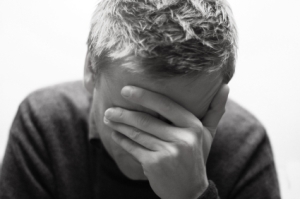We’ve all been through it before here in Eretz Yisrael. These days, it’s daily. Stabbings, shootings, and run-over attacks are taking its toll on all of us; on our mental and physical health.
A few days ago, I was walking down a main street in Givat Shaul and I was observing the people waiting at bus stops. Everyone was clearly nervous and anxious. Most everyone was looking back and forth, and front and back, all the time. Buses have less riders and there are more cars on the road; it is difficult to get a taxi. Obviously, we all must take every precaution necessary to protect ourselves, but stress will take a tremendous toll on us even when just hearing of a terrible attack and tragedy—not just when we are in a vulnerable state. And if stress isn’t dealt with, it can have terrible results.
The word “stress” is used in many contexts. Emotionally speaking, we can be “under stress” and we can be “stressed out.” Physically speaking, we can stress structures or devices to determine how they will hold up, and we can stress parts of our body to achieve strength or flexibility. In the world of mental health, stress is defined as a normal physical response to events that make you feel threatened or upset your balance in some way.
Our bodies carry something called a “stress response”—meaning, we have an involuntarily defensive reaction to a stressful event. This response helps us to remain extra alert and focused, and it can produce a sudden burst of energy. One of the most common examples of a stress response would be slamming on the brakes of the car when someone suddenly cuts in front of you in order to avoid an accident. The stress response also can sharpen your concentration and keep you on your toes, enabling you to perform more productively in a particular task.
Certain kinds of stress can indeed be healthy. But when the reaction goes beyond the types of responses discussed above, not only can it be debilitating, it can be dangerous. If your stress response is turned on too much of the time, and certainly all the time, it will almost always lead to serious issues—both psychological and physiological.
Recent research as well as emerging science conclusively links stress to pain of all types: heart disease, digestive disorders, sleep disorders, depression, obesity, autoimmune diseases and skin conditions such as eczema.
While the secretion of the stress hormone cortisol can have a positive effect on us in small amounts—enhancing our memory, immune systems and helping to produce a greater threshold for pain—the downside is that having too much cortisol in our system impairs our cognitive functions, causes blood sugar imbalances, muscle loss and fat gain, higher blood pressure and it weakens our immune system.
Sometimes, stress can be dealt with from the point of view of practical steps. For instance, someone who is stressed because of an overcrowded schedule can make changes in their schedule. But for times like now, when there is no hands-on practical solution, we must look elsewhere. Yes, we must have emunah and bitachon in Hashem, and we know that davening, reciting Tehillim and limud Torah are what we should be concentrating on.
Don R. Powell, Ph.D. of the American Institute for Preventive Medicine, offers some practical measures that might help us in addition:
- Maintain a program of healthy eating, good health habits and adequate sleep.
- You might not feel like this right now, but exercise anyway. This promotes physical fitness as well as emotional well-being.
- Balance work and play. All work and no play can make you feel stressed. Plan some time for hobbies and recreation. These activities relax your mind and are a good respite from life’s worries.
- Chessed! Help others. We concentrate on ourselves when we’re distressed. Sometimes helping others is the perfect remedy for whatever is troubling us.
- Take a warm shower or bath. This will soothe and calm your nerves, and relax your muscles.
- Have a good cry. Tears of sadness, joy or grief can help cleanse the body of substances that accumulate under stress, and will also release a natural pain-relieving substance from the brain.
- Learn acceptance. As we mentioned, a difficult problem can be out of your control. When this happens, accept it until changes can be made. This is better than worrying and getting nowhere.
- Talk out your It sometimes helps to talk with a friend, relative or your Rav. Another person can help you see a problem from a different point of view.
- Do relaxation exercises daily. Good ones include visualization (imagining a soothing, restful scene), deep muscle relaxation (tensing and relaxing muscle fibers), meditation and deep breathing.
- Budget your time. Make a “To Do” Prioritize your daily tasks. Avoid committing yourself to doing too much.
- As difficult as it might be right now, develop and maintain a positive attitude.
- Modify your environment to get rid of or manage your exposure to things that cause stress whenever possible.
Our pain is great when we think about the Matzav, the situation right now. There are those who have lost loved ones and those still fighting to recover in the hospitals. We are all feeling it and being with our friends and relatives who are feeling the same way can help you through. Talk about it and talk about your feelings.
May Hashem grant us the ability to cope and may he bring true peace to Klal Yisrael. Keeping our stress under control will “add hours to your day, days to your year and years to your life.”
Alan Freishtat is an A.C.E. CERTIFIED PERSONAL TRAINER and a BEHAVIORAL CHANGE and WELLNESS COACH with over 19 years of professional experience. Alan is the creator and director of the “10 Weeks to Health” program for weight loss. He is available for private coaching sessions, consultations, assessments and personalized workout programs both in his office and by telephone and skype. Alan also lectures and gives seminars and workshops. He can be reached at 02-651-8502 or 050-555-7175, or by email at alan@alanfitness.com Check out the his web site –www.alanfitness.com US Line: 516-568-5027.
The words of this author reflect his/her own opinions and do not necessarily represent the official position of the Orthodox Union.


